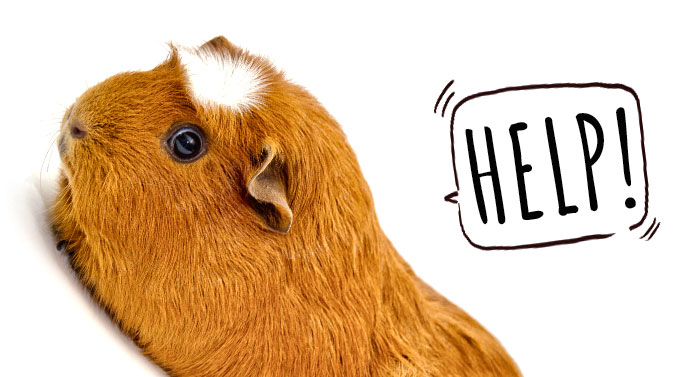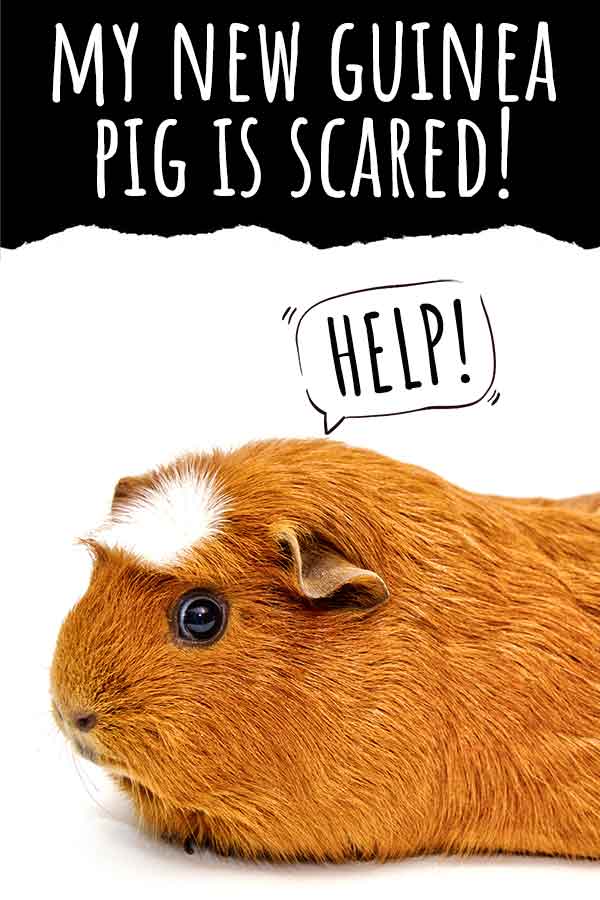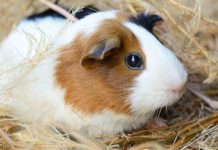It is totally normal for a new guinea pig to be scared.
After all, we can’t explain to them that this new place and those new faces are all safe and friendly.
But what we can do is make sure that they settle in as quickly as possible.
Why is my new guinea pig scared?
Guinea pigs are a small, prey species. In the wild there were lots of creatures that wanted to eat them.
Which is pretty scary!
By being scared of new things, wild guinea pigs helped to keep themselves safe.
It meant that they ran fast and hid when they saw anything which could be dangerous.
But in our pet homes, this trait isn’t actually useful any more.
Because the only creatures that should be able to get to them are us!
And we just want to look after them and be their friends.
But when they first arrive home they don’t know that, so we have to show them through our actions that they have nothing to be afraid of.
And to build up their trust.
Helping your guinea pig to settle in
When my new guinea pig is scared I have a few things I ensure that I do for her:
- Keep calm and quiet
- Provide lots of places to hide
- Give her tasty treats
- Approach her slowly
- Make sure she’s not lonely
Let’s take a look at each of those and how they will help your scared guinea pig.
Calm and quiet
Guinea pigs are scared by sudden noises or movements.
Just as surprising things would make us jump, a guinea pig can be shocked by something you might think was totally mundane.
Like you standing up to get a drink, or someone walking into the room with them.
Try to keep all movements, conversations and especially interactions with them very measured until they are settled in.
Places to hide
Guinea pigs feel safest when they think you can’t see them.
Giving them plenty of options for places to hide will help your pet to feel secure faster.
You might think that being exposed to you a lot would help, but actually feeling that they have a safe base seems to be even more beneficial.
Provide a couple of different styles of hides to help them the most.
A full cave, bridge-style hide open at both ends, and another open fully just at one side is ideal.
This gives them the choice between feeling fully hidden, and being able to observe you.
Go slowly
Give your new guinea pig at least a day to settle into their home and become familiar with their surroundings.
During this time just top up their food, hay and water periodically.
Have a look at them from outside the closed cage to make sure they seem okay, but don’t try to interact with them yet.
Over the next few days approach them gradually, starting off my petting them gently on the back if they will let you.
After that scoop them up, by putting your hand under their belly and bringing them into your lap.
Make sure you’ve got a nice pile of leaves for them to munch if they are feeling confident enough.
Tasty treats
Food makes a big difference when you are interacting with animals.
Giving them something in exchange for their time makes it feel more worth their while.
When they are tame you want your guinea pig to love spending time with you, but they will love it even more if they associate you with food.
Each time you go to their cage, bring a tasty fruit or veggie with you to offer to them.
If they are very scared and hiding, just put a piece in front of them and then withdraw a little.
Watch and see what they do next.
Once they have settled in a little they should feel brave enough to come and have a nibble, even with you there.
Don’t worry if this doesn’t happen the first few times you try though.
These naturally nervous creatures can take a while to become more secure with you around.
Guinea pigs need friends
A huge game changer when it comes to guinea pig confidence is their companions.
These are not solitary creatures, and they really need companionship.
In the wild they live in little communal groups, communicating with each other a lot of the time in a series of chirps, squeaks, hums and purs.
Having other guinea pigs around is a part of how they feel safe and therefore less scared.
There are more ears listening for predators, and more eyes watching for them.
A guinea pig alone finds it harder to relax and is therefore going to be more afraid.
But what about fighting?
You might be confused by this if you’ve heard about guinea pigs fighting with each other.
And it is true, guinea pigs do fight sometimes. And some guinea pigs seem to not get along with other pigs.
But the majority of the time they only do this if something else isn’t right.
Make sure to introduce them slowly.
That your cage has lots of space, and a food bowl, water bowl, hides and toys to chew for each of them.
It is worth taking the time to help them become friends.
Guinea pigs are easier for humans to handle if they have piggy friends with them, because it makes them feel safer.
My new guinea pig is scared
I have only once brought home a new guinea pig that didn’t seem scared at all.
He was a complete exception to the rule, and not what you would expect.
Almost all new guinea pigs are scared, and you don’t need to worry that it means something is wrong.
They are nature’s prey animals, and have just arrived in a place they don’t know, with new faces peeking at them, after a dark journey in a box, surrounded by weird noises.
Fear is natural, but we can help them overcome it quickly by keeping calm and quiet, moving slowly and giving her everything she needs to settle into her new home.
















